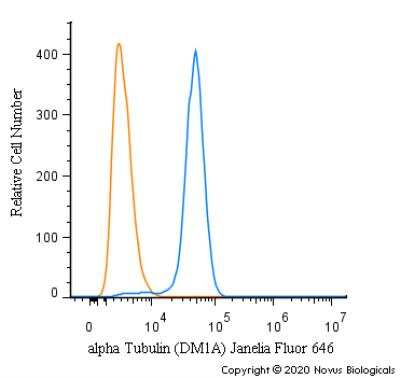alpha Tubulin Antibody (DM1A) [Janelia Fluor® 646]
Novus Biologicals, part of Bio-Techne | Catalog # NB100-690JF646


Conjugate
Catalog #
Key Product Details
Species Reactivity
Human, Mouse, Rat, Porcine, Avian, Bovine, Canine, Chicken, Chinese Hamster, Drosophila, Fungi, Goat, Guinea Pig, Hamster, Monkey, Parasite, Primate, Rabbit, Xenopus, Yeast
Applications
CyTOF-ready, Flow (Intracellular), Flow Cytometry, Immunocytochemistry/ Immunofluorescence, Immunohistochemistry, Immunohistochemistry-Frozen, Immunohistochemistry-Paraffin, Immunomicroscopy, Immunoprecipitation, Simple Western, Western Blot
Label
Janelia Fluor 646
Antibody Source
Monoclonal Mouse IgG1 kappa Clone # DM1A
Concentration
Please see the vial label for concentration. If unlisted please contact technical services.
Product Specifications
Immunogen
This alpha Tubulin Antibody (DM1A) was developed against native chicken brain microtubules.
Reactivity Notes
Use in Mouse reported in scientific literature (PMID:34871568) Use in Mouse reported in scientific literature (PMID:34533563). Yeast reactivity reported in scientific literature (PMID: 25126732). Goat reactivity reported in scientific literature (PMID:31805146). Will likely react with all mammals.
Specificity
This alpha Tubulin Antibody (DM1A) does not cross-react with beta Tubulin.
Marker
Microtubule Marker
Clonality
Monoclonal
Host
Mouse
Isotype
IgG1 kappa
Scientific Data Images for alpha Tubulin Antibody (DM1A) [Janelia Fluor® 646]
Flow Cytometry: alpha Tubulin Antibody (DM1A) [Janelia Fluor® 646] [NB100-690JF646] - An intracellular stain was performed on HeLa cells with alpha Tubulin (DM1A) Antibody NB100-690JF646 (blue) and a matched isotype control (orange). Cells were fixed with 4% PFA and then permeabilized with 0.1% saponin. Cells were incubated in an antibody dilution of 2.5 ug/mL for 30 minutes at room temperature. Both antibodies were conjugated to Janelia Fluor 646.
Applications for alpha Tubulin Antibody (DM1A) [Janelia Fluor® 646]
Application
Recommended Usage
CyTOF-ready
Optimal dilutions of this antibody should be experimentally determined.
Flow (Intracellular)
Optimal dilutions of this antibody should be experimentally determined.
Flow Cytometry
Optimal dilutions of this antibody should be experimentally determined.
Immunocytochemistry/ Immunofluorescence
Optimal dilutions of this antibody should be experimentally determined.
Immunohistochemistry
Optimal dilutions of this antibody should be experimentally determined.
Immunohistochemistry-Frozen
Optimal dilutions of this antibody should be experimentally determined.
Immunohistochemistry-Paraffin
Optimal dilutions of this antibody should be experimentally determined.
Immunomicroscopy
Optimal dilutions of this antibody should be experimentally determined.
Immunoprecipitation
Optimal dilutions of this antibody should be experimentally determined.
Simple Western
Optimal dilutions of this antibody should be experimentally determined.
Western Blot
Optimal dilutions of this antibody should be experimentally determined.
Application Notes
Optimal dilution of this antibody should be experimentally determined.
Formulation, Preparation, and Storage
Purification
Protein G purified
Formulation
50mM Sodium Borate
Preservative
0.05% Sodium Azide
Concentration
Please see the vial label for concentration. If unlisted please contact technical services.
Shipping
The product is shipped with polar packs. Upon receipt, store it immediately at the temperature recommended below.
Stability & Storage
Store at 4C in the dark.
Background: alpha Tubulin
Tyrosine ligase adds a C-terminal tyrosine to monomeric alpha tubulin. Assembled microtubules can again be detyrosinated by a cytoskeleton associated carboxypeptidase. Detyrosinated alpha tubulin is referred to as Glu-tubulin. Another post-translational modification of detyrosinated alpha tubulin is C-terminal polyglutamylation which is characteristic for microtubules in neuronal cells and the mitotic spindle.
Like GAPDH and beta-actin, alpha/beta tubulin is often used as a loading control in immunoblot applications (1). Alpha/beta tubulin is also good for counterstaining microtubules in immunofluorescence (2).
References
1. Hannen, R., Selmansberger, M., Hauswald, M., Pagenstecher, A., Nist, A., Stiewe, T., . . . Bartsch, J. W. (2019). Comparative Transcriptomic Analysis of Temozolomide Resistant Primary GBM Stem-Like Cells and Recurrent GBM Identifies Up-Regulation of the Carbonic Anhydrase CA2 Gene as Resistance Factor. Cancers (Basel), 11(7). doi:10.3390/cancers11070921
2. Nel, M., Joubert, A. M., Dohle, W., Potter, B. V., & Theron, A. E. (2018). Modes of cell death induced by tetrahydroisoquinoline-based analogs in MDA-MB-231 breast and A549 lung cancer cell lines. Drug Des Devel Ther, 12, 1881-1904. doi:10.2147/dddt.S152718
Long Name
Tubulin Alpha 1a
Alternate Names
Alpha-Tubulin 3, B-ALPHA-1, LIS3, TUBA1A, TUBA3, Tubulin B-Alpha-1
Gene Symbol
TUBA1A
Additional alpha Tubulin Products
Product Documents for alpha Tubulin Antibody (DM1A) [Janelia Fluor® 646]
Product Specific Notices for alpha Tubulin Antibody (DM1A) [Janelia Fluor® 646]
Sold under license from the Howard Hughes Medical Institute, Janelia Research Campus.
This product is for research use only and is not approved for use in humans or in clinical diagnosis. Primary Antibodies are guaranteed for 1 year from date of receipt.
